U.S. Securities and Exchange Commission
Washington, DC 20549
Notice of Exempt Solicitation
Submitted Pursuant to Rule 14a-6(g)
1. Name of the Registrant: Morgan Stanley
2. Name of person relying on exemption: The Comptroller of the City of New York, on behalf of the New York City Employees’ Retirement System, the New York City Teachers’ Retirement System, the New York City Police Pension Fund, and the New York City Board of Education Retirement System.
3. Address of person relying on exemption: 1 Centre Street, 8th Floor, New York, New York 10007
4. Written materials required to be submitted pursuant to Rule 14a-6(g)(1):
| · | Attachment 1: PowerPoint presentation in support of NYCRS' Clean Energy Financing Ratio Shareholder Proposal. |
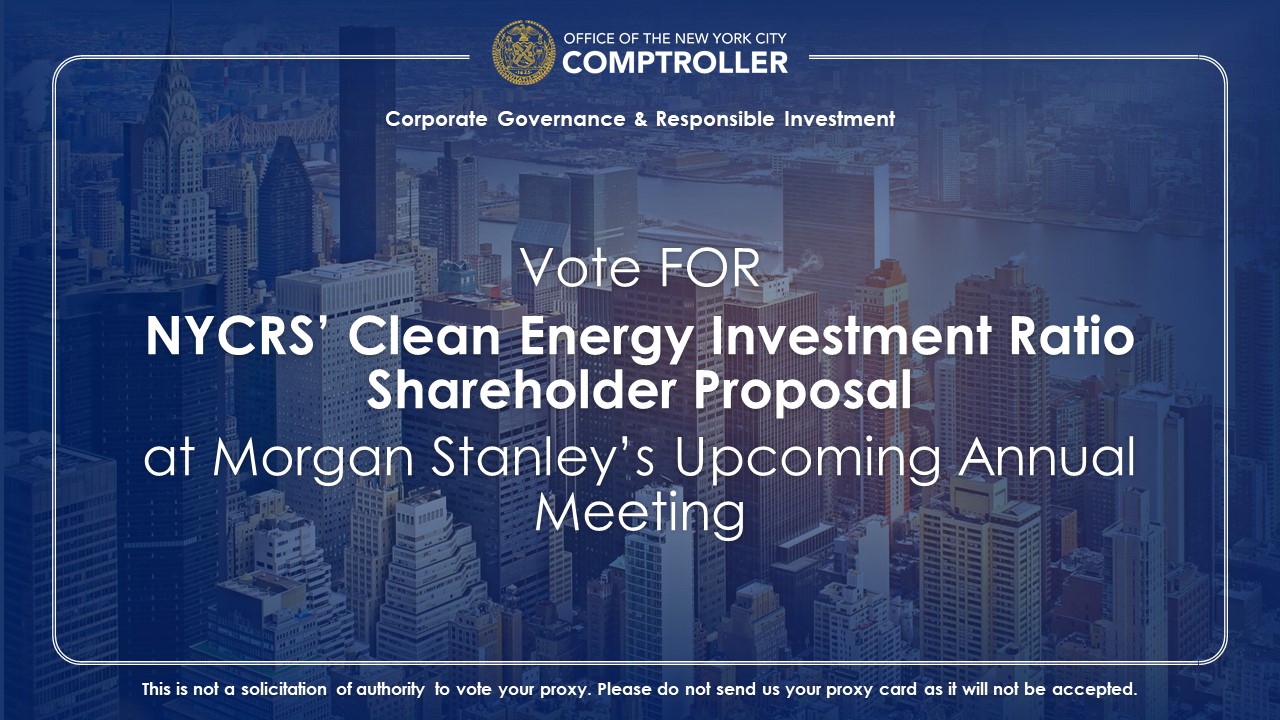
Vote FOR NYCRS’ Clean Energy Investment Ratio Shareholder Proposal at Morgan Stanley’s Upcoming Annual Meeting This is not a solicitation of authority to vote your proxy. Please do not send us your proxy card as it will not be accepted. Corporate Governance & Responsible Investment
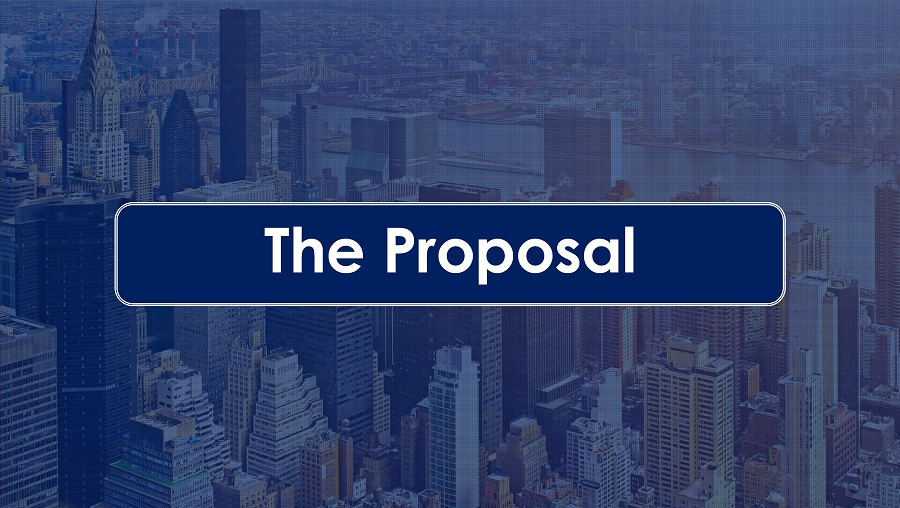
The Proposal
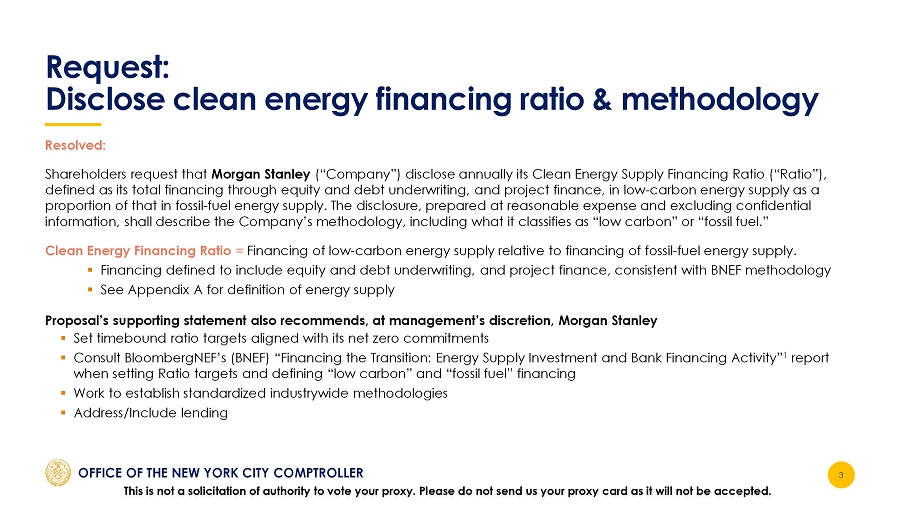
OFFICE OF THE NEW YORK CITY COMPTROLLER 3 Resolved: Shareholders request that Morgan Stanley (“Company”) disclose annually its Clean Energy Supply Financing Ratio (“Ratio”), defined as its total financing through equity and debt underwriting, and project finance, in low - carbon energy supply as a proportion of that in fossil - fuel energy supply. The disclosure, prepared at reasonable expense and excluding confidential information, shall describe the Company’s methodology, including what it classifies as “low carbon” or “fossil fuel.” Clean Energy Financing Ratio = Financing of low - carbon energy supply relative to financing of fossil - fuel energy supply. ▪ Financing defined to include equity and debt underwriting, and project finance, consistent with BNEF methodology ▪ See Appendix A for definition of energy supply Proposal’s supporting statement also recommends, at management’s discretion, Morgan Stanley ▪ Set timebound ratio targets aligned with its net zero commitments ▪ Consult BloombergNEF’s (BNEF) “Financing the Transition: Energy Supply Investment and Bank Financing Activity” 1 report when setting Ratio targets and defining “low carbon” and “fossil fuel” financing ▪ Work to establish standardized industrywide methodologies ▪ Address/Include lending Request: Disclose clean energy financing ratio & methodology This is not a solicitation of authority to vote your proxy. Please do not send us your proxy card as it will not be accepted.
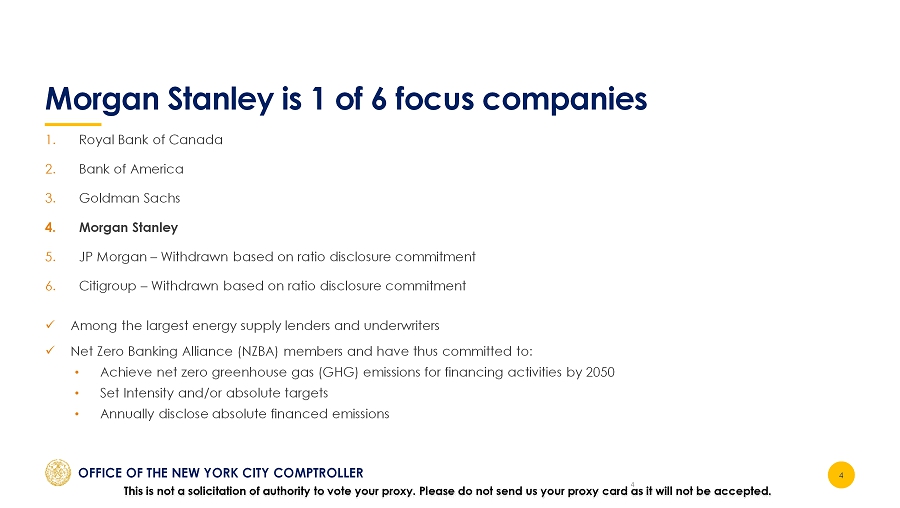
OFFICE OF THE NEW YORK CITY COMPTROLLER 4 Morgan Stanley is 1 of 6 focus companies 1. Royal Bank of Canada 2. Bank of America 3. Goldman Sachs 4. Morgan Stanley 5. JP Morgan – Withdrawn based on ratio disclosure commitment 6. Citigroup – Withdrawn based on ratio disclosure commitment x Among the largest energy supply lenders and underwriters x Net Zero Banking Alliance (NZBA) members and have thus committed to: • Achieve net zero greenhouse gas (GHG) emissions for financing activities by 2050 • Set Intensity and/or absolute targets • Annually disclose absolute financed emissions 4 This is not a solicitation of authority to vote your proxy. Please do not send us your proxy card as it will not be accepted.
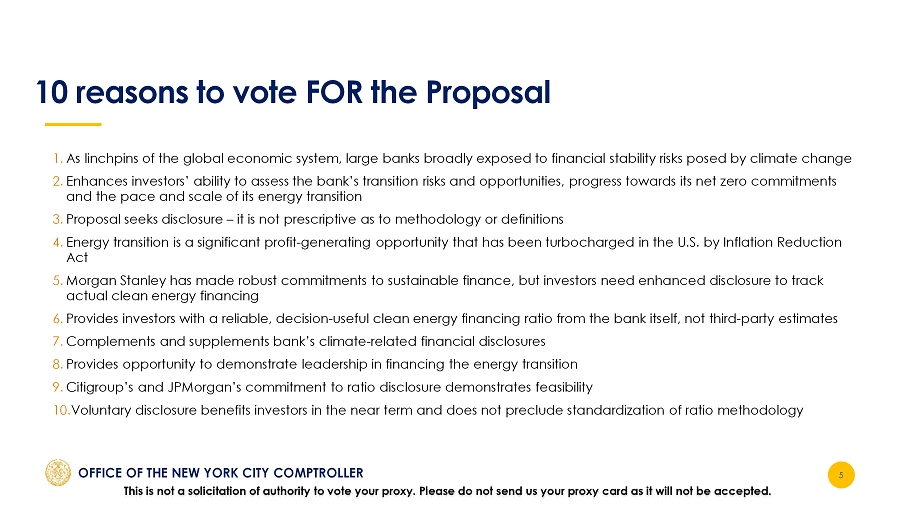
OFFICE OF THE NEW YORK CITY COMPTROLLER 5 10 reasons to vote FOR the Proposal 1. As linchpins of the global economic system, large banks broadly exposed to financial stability risks posed by climate change 2. Enhances investors’ ability to assess the bank’s transition risks and opportunities, progress towards its net zero commitment s and the pace and scale of its energy transition 3. Proposal seeks disclosure – it is not prescriptive as to methodology or definitions 4. Energy transition is a significant profit - generating opportunity that has been turbocharged in the U.S. by Inflation Reduction Act 5. Morgan Stanley has made robust commitments to sustainable finance, but investors need enhanced disclosure to track actual clean energy financing 6. Provides investors with a reliable, decision - useful clean energy financing ratio from the bank itself, not third - party estimates 7. Complements and supplements bank’s climate - related financial disclosures 8. Provides opportunity to demonstrate leadership in financing the energy transition 9. Citigroup’s and JPMorgan’s commitment to ratio disclosure demonstrates feasibility 10. Voluntary disclosure benefits investors in the near term and does not preclude standardization of ratio methodology This is not a solicitation of authority to vote your proxy. Please do not send us your proxy card as it will not be accepted.
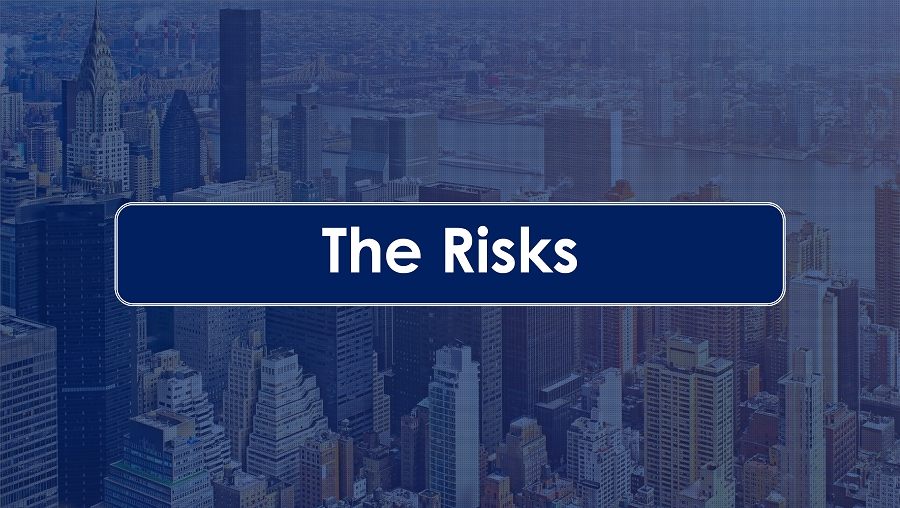
The Risks
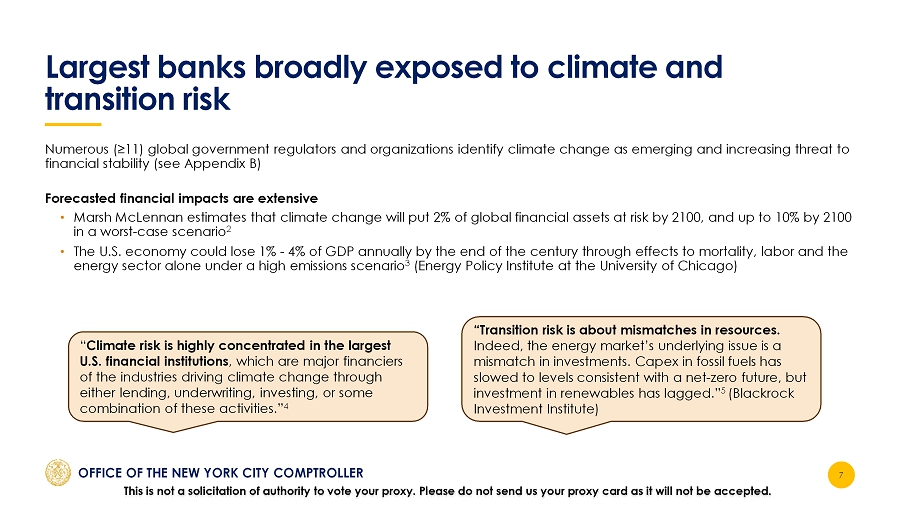
OFFICE OF THE NEW YORK CITY COMPTROLLER 7 Largest banks broadly exposed to climate and transition risk Numerous (≥11) global government regulators and organizations identify climate change as emerging and increasing threat to financial stability (see Appendix B) Forecasted financial impacts are extensive • Marsh McLennan estimates that climate change will put 2% of global financial assets at risk by 2100, and up to 10% by 2100 in a worst - case scenario 2 • The U.S. economy could lose 1% - 4% of GDP annually by the end of the century through effects to mortality, labor and the energy sector alone under a high emissions scenario 3 (Energy Policy Institute at the University of Chicago) “ Climate risk is highly concentrated in the largest U.S. financial institutions , which are major financiers of the industries driving climate change through either lending, underwriting, investing, or some combination of these activities.” 4 “Transition risk is about mismatches in resources. Indeed, the energy market’s underlying issue is a mismatch in investments. Capex in fossil fuels has slowed to levels consistent with a net - zero future, but investment in renewables has lagged.” 5 (Blackrock Investment Institute) This is not a solicitation of authority to vote your proxy. Please do not send us your proxy card as it will not be accepted.

The Science
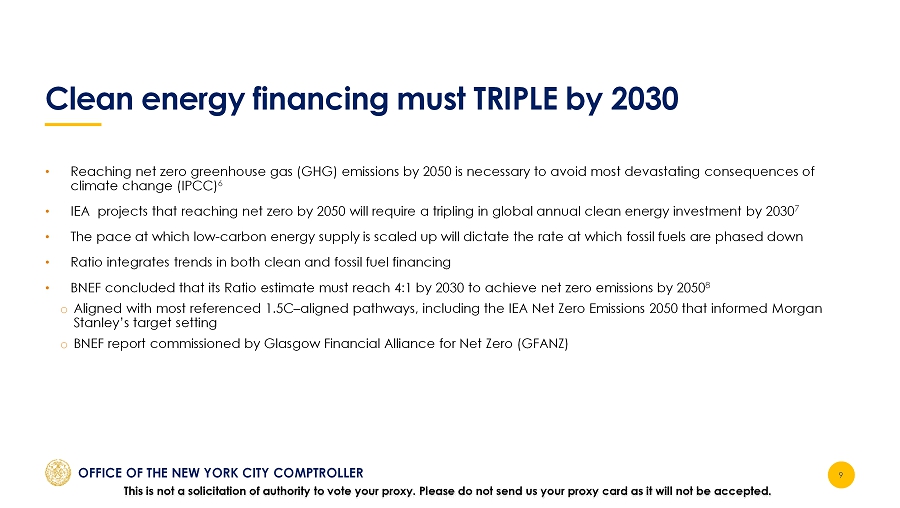
OFFICE OF THE NEW YORK CITY COMPTROLLER 9 Clean energy financing must TRIPLE by 2030 • Reaching net zero greenhouse gas (GHG) emissions by 2050 is necessary to avoid most devastating consequences of climate change (IPCC) 6 • IEA projects that reaching net zero by 2050 will require a tripling in global annual clean energy investment by 2030 7 • The pace at which low - carbon energy supply is scaled up will dictate the rate at which fossil fuels are phased down • Ratio integrates trends in both clean and fossil fuel financing • BNEF concluded that its Ratio estimate must reach 4:1 by 2030 to achieve net zero emissions by 2050 8 o Aligned with most referenced 1.5C – aligned pathways, including the IEA Net Zero Emissions 2050 that informed Morgan Stanley’s target setting o BNEF report commissioned by Glasgow Financial Alliance for Net Zero (GFANZ) This is not a solicitation of authority to vote your proxy. Please do not send us your proxy card as it will not be accepted.

The Opportunity
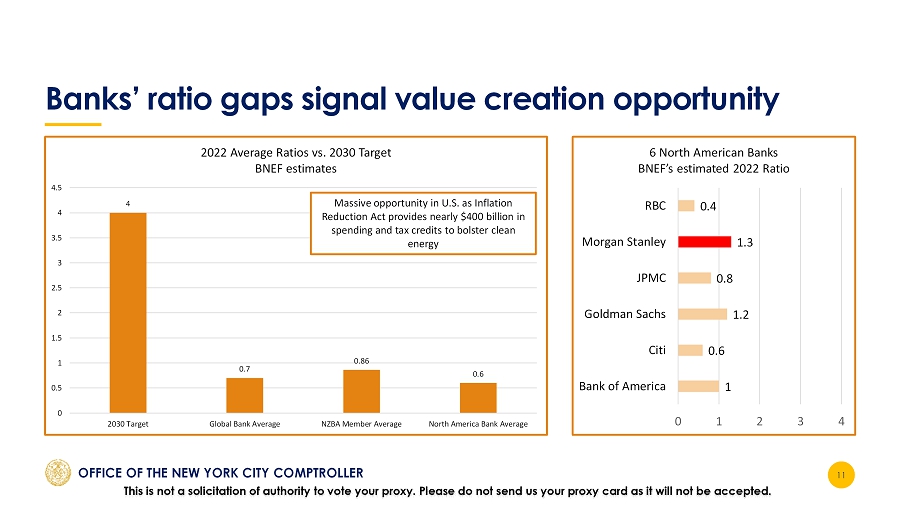
OFFICE OF THE NEW YORK CITY COMPTROLLER 11 Banks’ ratio gaps signal value creation opportunity 4 0.7 0.86 0.6 0 0.5 1 1.5 2 2.5 3 3.5 4 4.5 2030 Target Global Bank Average NZBA Member Average North America Bank Average 2022 Average Ratios vs. 2030 Target BNEF estimates Massive opportunity in U.S. as Inflation Reduction Act provides nearly $400 billion in spending and tax credits to bolster clean energy 1 0.6 1.2 0.8 1.3 0.4 0 1 2 3 4 Bank of America Citi Goldman Sachs JPMC Morgan Stanley RBC 6 North American Banks BNEF’s estimated 2022 Ratio This is not a solicitation of authority to vote your proxy. Please do not send us your proxy card as it will not be accepted.
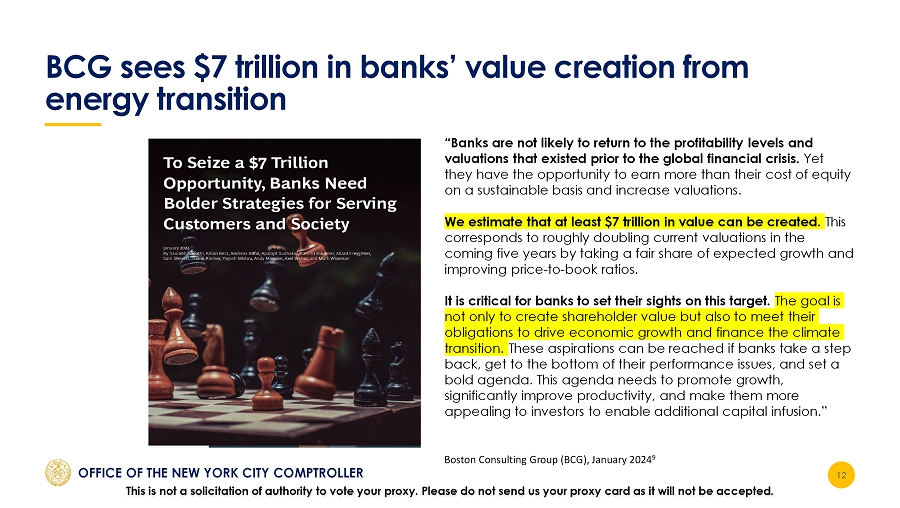
OFFICE OF THE NEW YORK CITY COMPTROLLER 12 BCG sees $7 trillion in banks’ value creation from energy transition Boston Consulting Group (BCG), January 2024 9 This is not a solicitation of authority to vote your proxy. Please do not send us your proxy card as it will not be accepted. “Banks are not likely to return to the profitability levels and valuations that existed prior to the global financial crisis. Yet they have the opportunity to earn more than their cost of equity on a sustainable basis and increase valuations. We estimate that at least $7 trillion in value can be created. This corresponds to roughly doubling current valuations in the coming five years by taking a fair share of expected growth and improving price - to - book ratios. It is critical for banks to set their sights on this target. The goal is not only to create shareholder value but also to meet their obligations to drive economic growth and finance the climate transition. These aspirations can be reached if banks take a step back, get to the bottom of their performance issues, and set a bold agenda. This agenda needs to promote growth, significantly improve productivity, and make them more appealing to investors to enable additional capital infusion.”
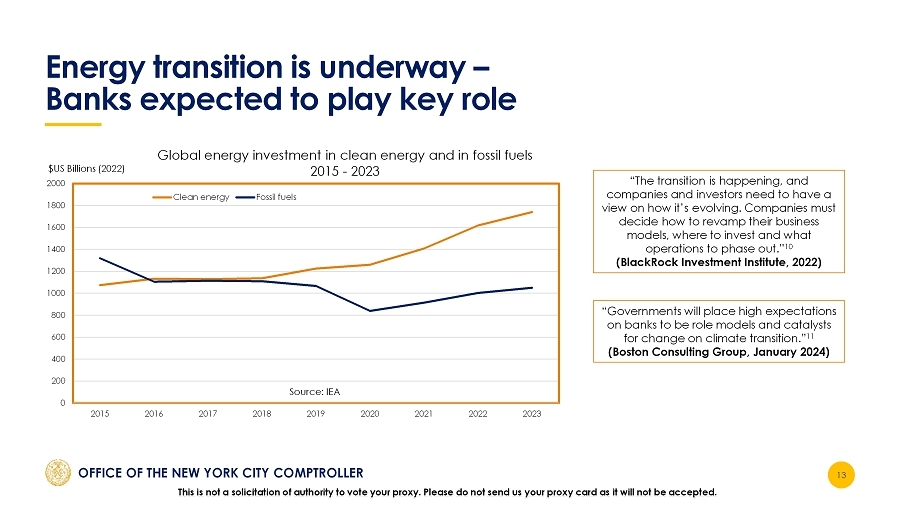
OFFICE OF THE NEW YORK CITY COMPTROLLER 13 Energy transition is underway – Banks expected to play key role 0 200 400 600 800 1000 1200 1400 1600 1800 2000 2015 2016 2017 2018 2019 2020 2021 2022 2023 $US Billions (2022) Global energy investment in clean energy and in fossil fuels 2015 - 2023 Clean energy Fossil fuels “The transition is happening, and companies and investors need to have a view on how it’s evolving. Companies must decide how to revamp their business models, where to invest and what operations to phase out.” 10 (BlackRock Investment Institute, 2022) This is not a solicitation of authority to vote your proxy. Please do not send us your proxy card as it will not be accepted. “Governments will place high expectations on banks to be role models and catalysts for change on climate transition.” 11 (Boston Consulting Group, January 2024) Source: IEA
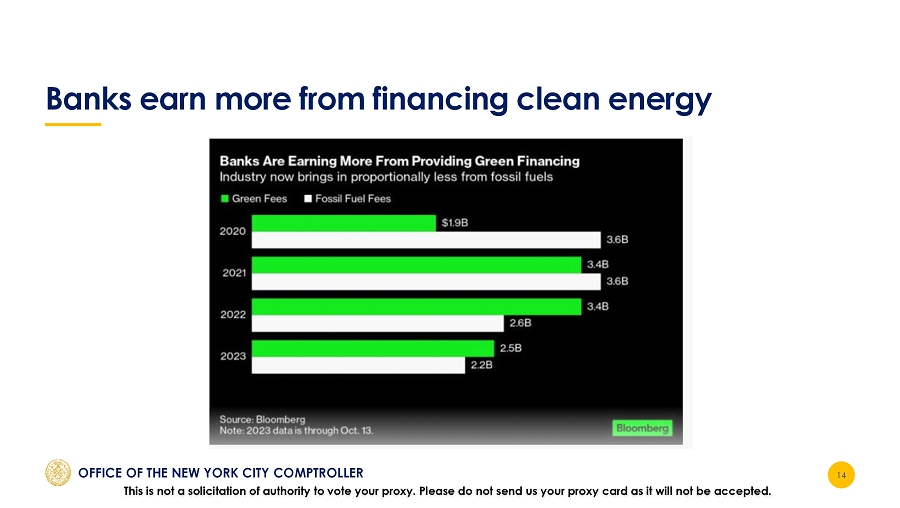
OFFICE OF THE NEW YORK CITY COMPTROLLER 14 Banks earn more from financing clean energy This is not a solicitation of authority to vote your proxy. Please do not send us your proxy card as it will not be accepted.

Complimentary Disclosure
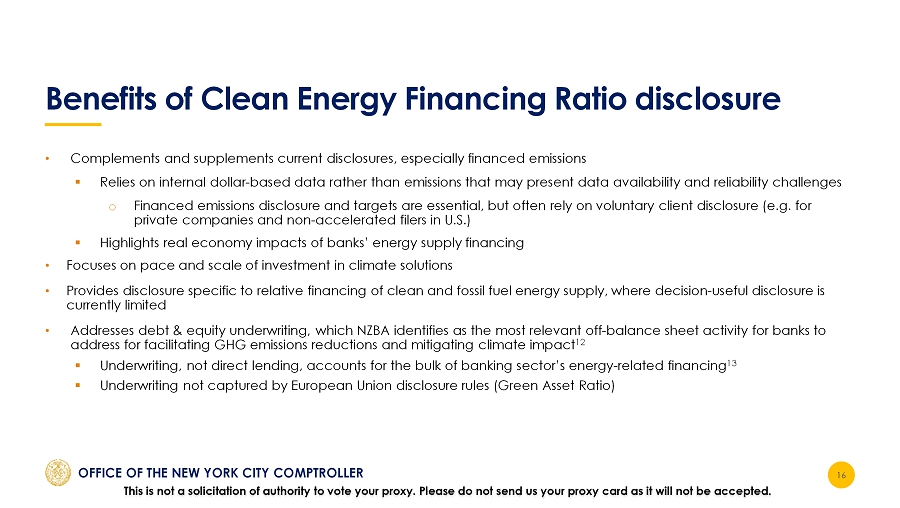
OFFICE OF THE NEW YORK CITY COMPTROLLER 16 Benefits of Clean Energy Financing Ratio disclosure • Complements and supplements current disclosures, especially financed emissions ▪ Relies on internal dollar - based data rather than emissions that may present data availability and reliability challenges o Financed emissions disclosure and targets are essential, but often rely on voluntary client disclosure (e.g. for private companies and non - accelerated filers in U.S.) ▪ Highlights real economy impacts of banks’ energy supply financing • Focuses on pace and scale of investment in climate solutions • Provides disclosure specific to relative financing of clean and fossil fuel energy supply, where decision - useful disclosure is currently limited • Addresses debt & equity underwriting, which NZBA identifies as the most relevant off - balance sheet activity for banks to address for facilitating GHG emissions reductions and mitigating climate impact 12 ▪ Underwriting, not direct lending, accounts for the bulk of banking sector’s energy - related financing 13 ▪ Underwriting not captured by European Union disclosure rules (Green Asset Ratio) This is not a solicitation of authority to vote your proxy. Please do not send us your proxy card as it will not be accepted.
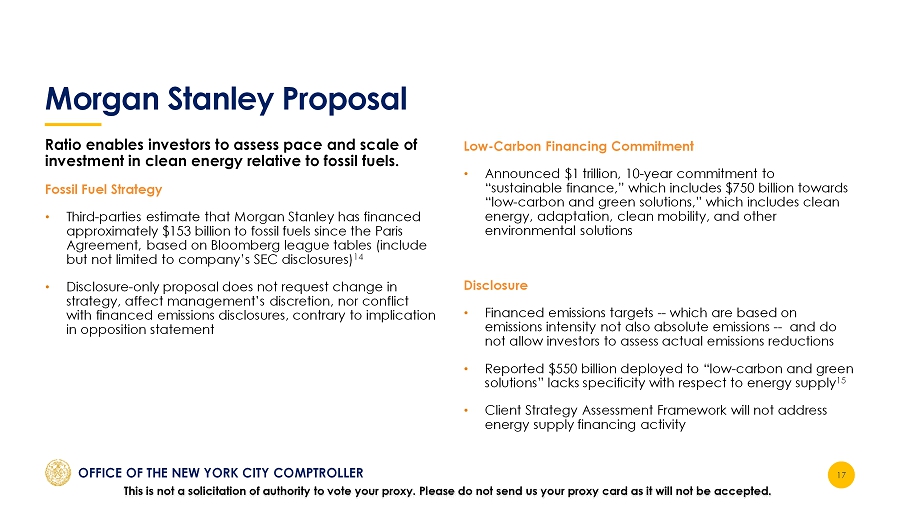
OFFICE OF THE NEW YORK CITY COMPTROLLER 17 Ratio enables investors to assess pace and scale of investment in clean energy relative to fossil fuels. Fossil Fuel Strategy • Third - parties estimate that Morgan Stanley has financed approximately $153 billion to fossil fuels since the Paris Agreement, based on Bloomberg league tables (include but not limited to company’s SEC disclosures) 14 • Disclosure - only proposal does not request change in strategy, affect management’s discretion, nor conflict with financed emissions disclosures, contrary to implication in opposition statement Low - Carbon Financing Commitment • Announced $1 trillion, 10 - year commitment to “sustainable finance,” which includes $750 billion towards “low - carbon and green solutions,” which includes clean energy, adaptation, clean mobility, and other environmental solutions Disclosure • Financed emissions targets -- which are based on emissions intensity not also absolute emissions -- and do not allow investors to assess actual emissions reductions • Reported $550 billion deployed to “low - carbon and green solutions” lacks specificity with respect to energy supply 15 • Client Strategy Assessment Framework will not address energy supply financing activity Morgan Stanley Proposal This is not a solicitation of authority to vote your proxy. Please do not send us your proxy card as it will not be accepted.
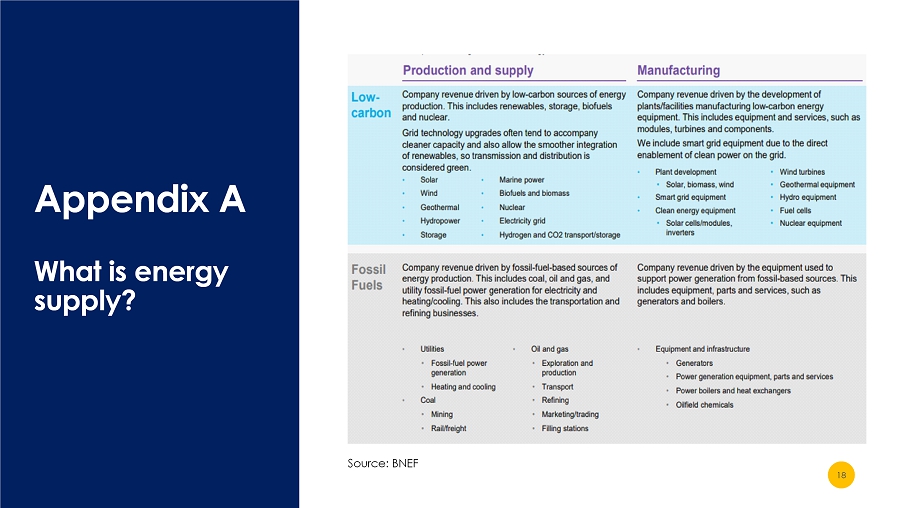
18 Appendix A What is energy supply? Source: BNEF
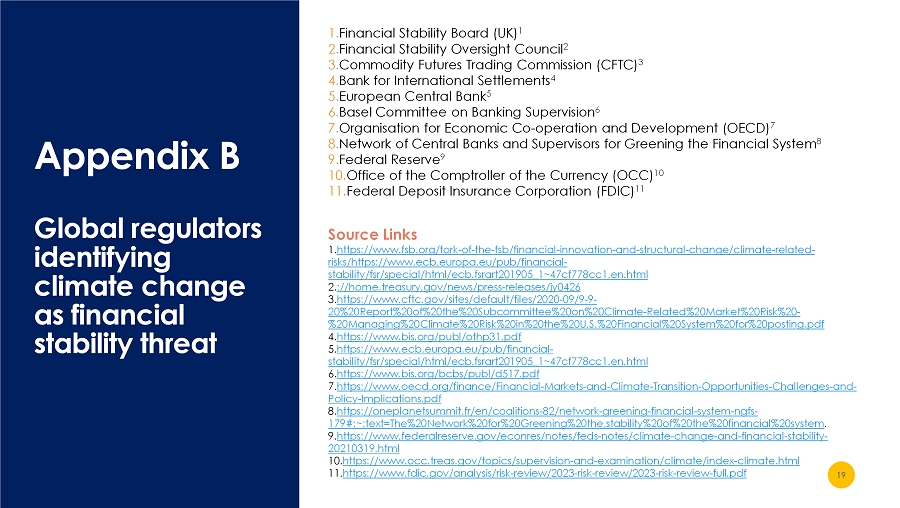
19 Appendix B Global regulators identifying climate change as financial stability threat 1. Financial Stability Board (UK) 1 2. Financial Stability Oversight Council 2 3. Commodity Futures Trading Commission (CFTC) 3 4. Bank for International Settlements 4 5. European Central Bank 5 6. Basel Committee on Banking Supervision 6 7. Organisation for Economic Co - operation and Development (OECD) 7 8. Network of Central Banks and Supervisors for Greening the Financial System 8 9. Federal Reserve 9 10. Office of the Comptroller of the Currency (OCC) 10 11. Federal Deposit Insurance Corporation (FDIC) 11 Source Links 1. https://www.fsb.org/tork - of - the - fsb/financial - innovation - and - structural - change/climate - related - risks/https://www.ecb.europa.eu/pub/financial - stability/fsr/special/html/ecb.fsrart201905_1~47cf778cc1.en.html 2. ://home.treasury.gov/news/press - releases/jy0426 3. https://www.cftc.gov/sites/default/files/2020 - 09/9 - 9 - 20%20Report%20of%20the%20Subcommittee%20on%20Climate - Related%20Market%20Risk%20 - %20Managing%20Climate%20Risk%20in%20the%20U.S.%20Financial%20System%20for%20posting.pdf 4. https://www.bis.org/publ/othp31.pdf 5. https://www.ecb.europa.eu/pub/financial - stability/fsr/special/html/ecb.fsrart201905_1~47cf778cc1.en.html 6. https://www.bis.org/bcbs/publ/d517.pdf 7. https://www.oecd.org/finance/Financial - Markets - and - Climate - Transition - Opportunities - Challenges - and - Policy - Implications.pdf 8. https://oneplanetsummit.fr/en/coalitions - 82/network - greening - financial - system - ngfs - 179#:~:text=The%20Network%20for%20Greening%20the,stability%20of%20the%20financial%20system . 9. https://www.federalreserve.gov/econres/notes/feds - notes/climate - change - and - financial - stability - 20210319.html 10. https://www.occ.treas.gov/topics/supervision - and - examination/climate/index - climate.html 11. https://www.fdic.gov/analysis/risk - review/2023 - risk - review/2023 - risk - review - full.pdf
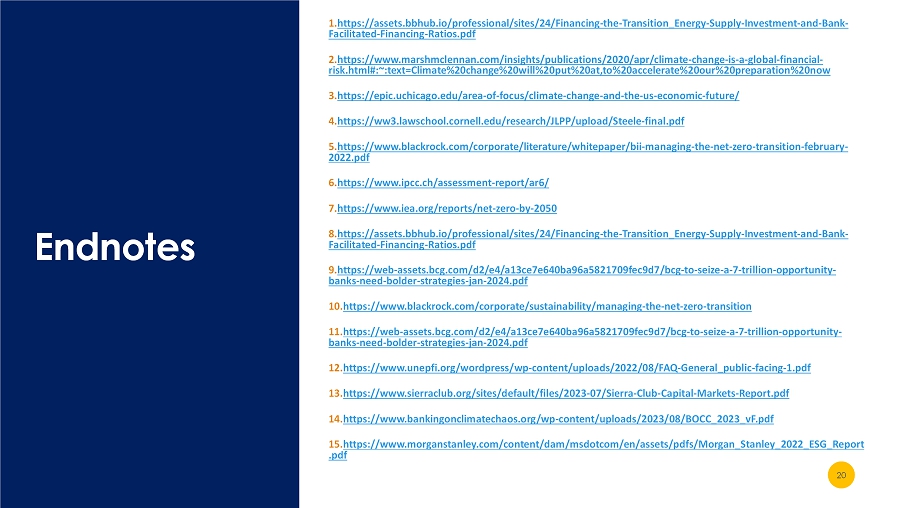
20 Endnotes 1. https://assets.bbhub.io/professional/sites/24/Financing - the - Transition_Energy - Supply - Investment - and - Bank - Facilitated - Financing - Ratios.pdf 2. https://www.marshmclennan.com/insights/publications/2020/apr/climate - change - is - a - global - financial - risk.html#:~:text=Climate%20change%20will%20put%20at,to%20accelerate%20our%20preparation%20now 3. https://epic.uchicago.edu/area - of - focus/climate - change - and - the - us - economic - future/ 4. https://ww3.lawschool.cornell.edu/research/JLPP/upload/Steele - final.pdf 5. https://www.blackrock.com/corporate/literature/whitepaper/bii - managing - the - net - zero - transition - february - 2022.pdf 6. https://www.ipcc.ch/assessment - report/ar6/ 7. https://www.iea.org/reports/net - zero - by - 2050 8. https://assets.bbhub.io/professional/sites/24/Financing - the - Transition_Energy - Supply - Investment - and - Bank - Facilitated - Financing - Ratios.pdf 9. https://web - assets.bcg.com/d2/e4/a13ce7e640ba96a5821709fec9d7/bcg - to - seize - a - 7 - trillion - opportunity - banks - need - bolder - strategies - jan - 2024.pdf 10. https://www.blackrock.com/corporate/sustainability/managing - the - net - zero - transition 11. https://web - assets.bcg.com/d2/e4/a13ce7e640ba96a5821709fec9d7/bcg - to - seize - a - 7 - trillion - opportunity - banks - need - bolder - strategies - jan - 2024.pdf 12. https://www.unepfi.org/wordpress/wp - content/uploads/2022/08/FAQ - General_public - facing - 1.pdf 13. https://www.sierraclub.org/sites/default/files/2023 - 07/Sierra - Club - Capital - Markets - Report.pdf 14. https://www.bankingonclimatechaos.org/wp - content/uploads/2023/08/BOCC_2023_vF.pdf 15. https://www.morganstanley.com/content/dam/msdotcom/en/assets/pdfs/Morgan_Stanley_2022_ESG_Report .pdf